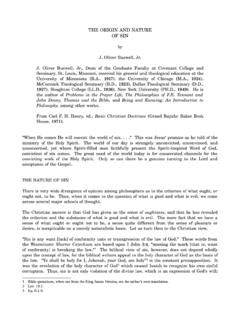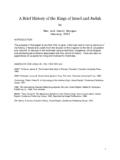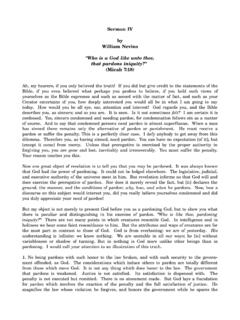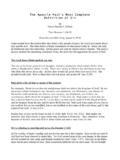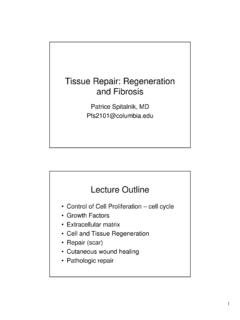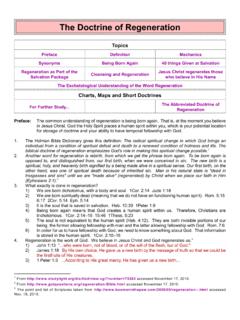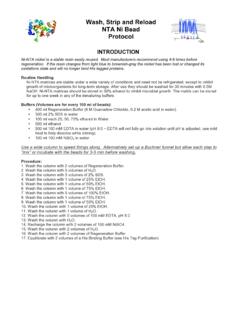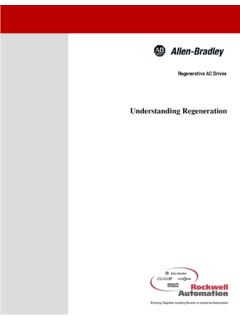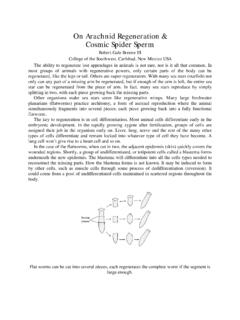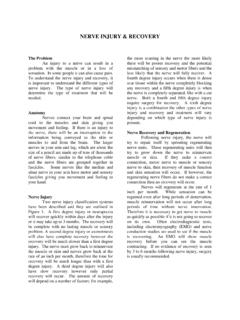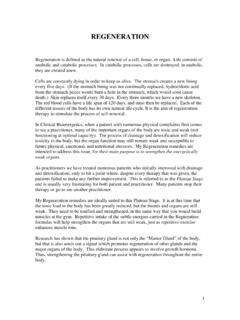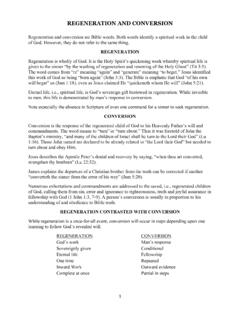Transcription of REGENERATION: BEGINNING WITH GOD by Eric J. Alexander
1 regeneration : BEGINNING with GODbyEric J. AlexanderAn article from Tenth, An Evangelical Quarterly, July, 1980(Official papers of the 1980 Philadelphia Conference on Reformed Theology)I spent the first fifteen years of my ministry in a small country town in Ayrshire in Scotland. Not far from there, in the seventeenth century, a godly young man named David Dickson ministered in a town called Irvine. Some remarkable revivals broke out, associated with a series of sermons on the subject of regeneration . That often seems to have happened in times of revival. The history of revival bears witness to the frequency with which regeneration was a theme accompanying it. David Dickson preached twenty seven sermons in his series, which is more like the time scale for the subject of regeneration , I would think, than one occasion. But in the midst of it he gave this definition: regeneration is the work of God's invincible power and mere grace, wherein by his Spirit accompanying his Word he quickeneth a redeemed person lying dead in his sins and reneweth him in his mind, his will and all the powers of his soul, convincing him savingly of sin and righteousness and judgment, and making him heartily to embrace Christ and salvation, and to consecrate himself to the service of God in Christ all the days of his would be difficult to find a more satisfying summary of regeneration than that.
2 I want to try to come to grips with it biblically by turning to the third chapter of John's Gospel where our Lord is presenting this truth to Nicodemus, a ruler of the Jews and a teacher in Israel. Not that the teaching of Jesus in John 3 is unique or out of harmony with the rest of his teaching in the Gospels! Indeed, the doctrine of regeneration which is taught in this chapter is really the logical link as Professor John Murray points out between our Lord's teaching on the pollution and depravity of the natural human heart, on the one hand, and the demands and requirements of membership of his kingdom, on the other. There is a tremendous gulf between the teaching of our Lord on the depravity and sickness of the human heart, including the inability of man by nature, and the requirements which he urges upon us as members of his kingdom.
3 The logical and vital link between these two is Dickson, Select Practical Writings of David Dickson, Vol. 1 (Edinburgh: Printed for the Assemblies Committee, 1845), p. Must Be Born AnewThe necessity of regeneration could scarcely be put more categorically than in Jesus' words in verses 3, 5, and 7: "I tell you the truth, unless a man is born again, he cannot see the kingdom of God.. I tell you the truth, unless a man is born of water and the Spirit, he cannot enter the kingdom of God.. You should not be surprised at my saying, 'You must be born again.'" This necessity has certain specific , it is an indispensible necessity. I mean by that, that there are some things more important than others, even amongst the things which Scripture presses upon us, and that regeneration is among those items of utmost importance. That is the significance of our Lord's words in verses 3 and 5 "I tell you the truth [literally, verily, verily].
4 " They are a kind of underlining. Here Jesus is underlining his words to score their significance for us. There are some things, you see, that a man may dispense with and still enter the kingdom of God. He may enter the kingdom of God without ever being baptized or sitting at the Lord's Table. They are important although not indispensible. But what Jesus is here describing is an indispensible necessity, for a man will never in all eternity enter the kingdom of God without being regenerated by the Holy , it is a universal necessity. Not everything Jesus says is a universal necessity. For example, he said to the rich young ruler that he must sell all that he had and give to the poor. But Jesus does not tell everybody to sell all that he or she has and give to the poor. That was necessary for him but not for everybody. However, Jesus' words about regeneration are of a different order.
5 Jesus said, "Unless a man is born again," and this means that regeneration was a necessity for Nicodemus personally precisely because regeneration is a necessity for all men universally. It derives from the fact that by nature every man is defiled, deadened and corrupted by sin. This is what Jesus is referring to in verse 6: "Flesh gives birth to flesh, but the Spirit gives birth to spirit." Flesh here means human nature as it is dominated and polluted by sin. So what Jesus is telling us is that unrenewed human nature dominated by sin can only reproduce itself. regeneration is a universal necessity because man by his own fleshly effort has a universal inability to produce anything except the flesh. No amount of education will produce regeneration . No amount of external religion will do anything to change this basic position. This is the law of generation, which you find illustrated in the first part of Genesis: "Creatures.
6 According to their kinds" (Gen. 1:21). Man brings forth flesh from his flesh, and sinful flesh remains sinful flesh. So Jesus says in verse 7, "You should not be surprised at my saying, 'You must be born again.'" The new birth is a universal necessity because the disabling, defiling power of sin is will notice in verse 4 that Nicodemus misunderstands. He thinks that Jesus is speaking about a new start. If only a man could be born again in the sense of entering his mother's womb a second time! Nicodemus thinks that Jesus is referring to this kind of new BEGINNING . But Jesus says that this would not help in the slightest, because a thousand new starts would only produce the same weary tale of defeat, pollution and disablement. It is a new nature, a new heart which man needs. That is, he needs to be born of the is a very important thing for us to grasp, because the point is not merely academic.
7 It is significant for our evangelism. We need to recognize that man is not just confused and needing to be sorted out in his thinking, nor is he merely needing to be redirected into the ways of God, nor is it only the fact that he is guilty and needs to be forgiven. Basically his problem is that he is dead and needs to be resurrected. He needs new life. Our evangelism needs to be based on this foundation. We need rightly to diagnose the problem of man before we even begin rightly to understand the gospel that he needs. We may help a man to understand his confusion and lead him into the right way. We may indoctrinate him. But the one thing that we can never do is regenerate him, and this is why our Lord is at pains to lay down the universal necessity of regeneration is not only an indispensible and universal necessity; it is also an unchangeable necessity.
8 It is unchangeable because of the issues with which it deals. I refer to verses 3 and 5 particularly, for these show that regeneration deals not with passing, changing things but with the unchanging laws of God concerning his kingdom how a man may perceive the kingdom and enter it. The kingdom of God is the sphere in which God brings rebel sinners into subjection to his gracious rule and authority. It is the realm in which God's grace is to be tested and experienced. To see the kingdom is to grasp or understand it, to have the glory and wonder of it dawn upon one. But the glory of the kingdom will never dawn upon a man until he has been born again. Similarly, to enter the kingdom of God means to experience the blessings of the kingdom, to be admitted to its privileges and joys both present and future. But apart from the new birth, says Jesus, we shall never experience any of these joys.
9 This is an unchanging necessity because it deals with these unchanging laws of God's New CreationWhat, then, is this work of grace which is an indispensible, universal and unchangeable necessity? That leads me to the nature of regeneration , which is a radical, total change in sinful man accomplished solely by God the Holy Spirit, producing new life what Paul calls "a new creation." The very metaphor that our Lord uses in his conversation with Nicodemus leads into the nature of it, for he is saying that regeneration is as momentous as birth is significant that the New Testament uses such radical language to describe Christian beginnings, language like resurrection, regeneration and re creation. For it is teaching that being brought out of darkness into light is something that can only be paralleled by a birth. It is like a new life BEGINNING .
10 It is parallel, if you like to a new creation. "God, who said, 'Let light shine out darkness,' made his light shine in our hearts to give us the light of the knowledge of the glory of God in the face of Christ" (2 Cor. 4:6).One of the things we need so much to grasp in our day is the wonder of what happened to us when we were born into the kingdom of God's grace. I am sure that one of the reasons people are looking for additional, secondary thrills offered at some future stage in their spiritual experience is that they have devalued the initial work of grace. We speak as though it were something we had done, something anyone can do. But the Bible describes it as the miracle of resurrection, as the miracle of a new is something which we greatly misunderstand when we speak, as we often do, about people who have been saved from some particularly dissolute level of society and some particularly debauched kind of life.
